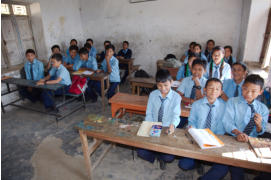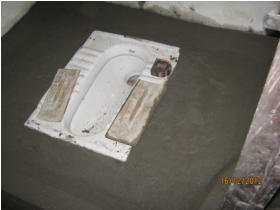










Important Note: It is important to understand that all trips to Nepal are self funded and no money
donated to help the children will be used for travel expenses incurred by organization staff. This is explicitly
specified in the bylaws of the organization.
In 2012 I organized to go trekking to Makalu Base Camp in Nepal. The trip was to be a celebration of my 40th birthday
(perhaps a little late..). I was looking for a region off the usual tourist trail but still offering the scenery and challenges
associated with classic Nepal Treks. For those interested in the trekking aspect of the trip I wrote a blog on the
experience which can be found at http://trekkingmakalu.blogspot.com/
After choosing the region I wanted to visit in Nepal I set about finding a tour operator that could organize the trek. I
found a local organization named Makalu Arun Social Trek. Their offering was cheaper than traditional tour operators,
were using some of their profit to support a local orphanage and expenses during the trek were paid directly to local
people. To me it was a win-win, I get a cheaper trip and the local community benefits.
Part of the itinerary arranged by MAST included staying in Khandbari for 5 days after
the trek and volunteering at a local orphanage. The volunteering turned out to be
visiting the orphanage at 7 in the morning and helping the kids with homework for
about an hour before school. I didn’t see the kids much that year but it was more
than enough to understand their situation and
the help they need.
I knew I would visit the orphanage and wanted to bring some gift. My bags were
already at the weight limit for the internal flight as I was trekking for three weeks so
I needed to find something small. I brought a couple of Rubik’s cubes - I figured they
didn’t need batteries and they would be interesting for the kids.
The day before we went trekking we visited the orphanage for a few minutes. I had the cubes in
my hand and the kids were shy at first but following wondering what I as holding. I gave them
the cubes and they wandered off figuring out what they were. I offered to show them how the
cube works. I was immediately surrounded by all 12 kids with curious faces. As I was leaving I
asked whom I should leave the cubes with. My first suggestion was a competition to see who
could solve it before I returned 3 weeks later. I suggested giving one to the boys and one to the
girls. I then asked who the smartest kid was. Rabin, the eldest boy, looked at me with an almost
angry face. “What do you mean” he said, “we’re all smart”. I was really impressed by his outrage
that I could potentially be questioning the smarts of any of his friends.
After we returned to Khandbari there was a lot of
downtime as the kids were in school and the volunteering time was so limited. I
stayed with Tejanath in his house in the Naya Bazar area of Khandbari. Tejanath
sent me to visit a number of schools in the area and I even taught an English class
at the government school. During morning homework sessions I could see some of
the kids were less than attentive whereas Rabin was deep in his books and
studying. I was impressed that a kid with no adult supervision and nobody telling
him to study had figured out that education is the best way to take control of his own future. As I visited the different
schools in the town I recognized many of the orphanage kids in their classes. The majority were sitting in the back row.
When I went to Rabin’s school I found him front and center.
One evening I was sitting in Tejanath’s house and chatting about the kids.
They are pretty well looked after right now. Tejanath raises money
through MAST and through SESF (another charity he runs) which help pay
some day to day costs. There is an organization named Makalu
TrishaktiSamuha (MATS) that actually runs the orphanage. They receive
funding from the Nepali government and local VDC. Government school is
free and many of the children have been given free spots in local private
schools. The food the kids receive is very basic (rice, lentils and potato
twice a day) and their accommodation is also basic but this is true for
many people in the region.
I wasn’t so concerned about their current status but more their futures. One thing that struck me is that there is no
industry in the region and jobs would be very hard to come by. The town has a police station and an army barracks but
other than that most people seem to run shops where only family would be employed. I asked Tejanath what the plan
was to move the kids on from the orphanage as they get older. His answer was “send the boys abroad and marry the
girls off young”.
One of the guides we had on our trek had worked abroad for three years. There are companies that recruit Nepali kids
that have a basic level of education. They arrange visas, jobs and accommodation. The problem is they then charge
extortionate rates for those services. Our guide had worked in Malaysia for three years and returned to Nepal without
earning a penny for himself. To me it amounts to modern day slavery.
For the girls I fear the future may be even more bleak. Nepal has arranged marriages and also still has a very strong
caste system. When women marry they pay a dowry to their new husband. I can only imagine that girls from the
orphanage, from lower castes and not having money for a dowry would not be married to the classiest gentlemen in the
town.
While I was in Khandbari I decided I wanted to help in some way. I promised Rabin
I would fund his education through college. He wants to be a doctor and I believe
he is both smart enough and caring enough to be a very good doctor. I had Rabin
sign a deal. I included the usual type of conditions such as maintaining good
grades and also included that he must help others when he is finished his
education. I have asked that if he successfully completes a medical degree that he
would serve in the local community for a number of years to provide a much
needed service. Not long after returning home I received Rabin’s next report card. He was ranked number one in his
school year. It is still my intention to fund Rabin’s education personally.
Whilst in Khandbari that first year I also committed to paying the rent for the
orphanage. I figured local people should be able to provide food for these
children who are after all from their own community. Raising cash to pay for the
building could however be difficult. I also organized to have a toilet installed in
their house. They had been using a rather nasty outhouse - so nasty that I think
some of the kids were using the bushes instead.
When I returned to America I felt guilty. I had singled out one of 12 kids and guaranteed him a future but still left the
other 11 in the same predicament where I had found them. I knew I couldn’t afford to support all these children alone. It
was at that time I decided to form a 501(c)3 organization and raise funds to give the same opportunities to each of the
children.







All Photographs (c) Michael Fingleton






